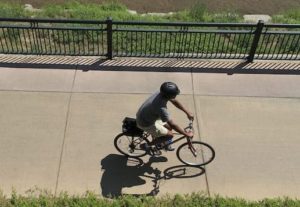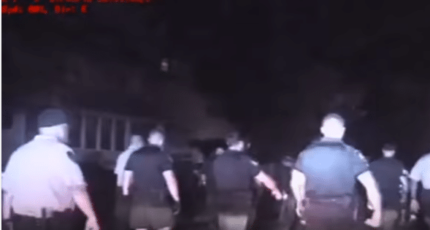
Chicago’s most common cyclist citation was for riding on the sidewalk.
“Biking while Black” is an all-too-real phenomenon for residents of Chicago’s predominately African-American neighborhoods, according to a new report.
A Chicago Tribune review of the city’s police statistics revealed that more than twice as many bike tickets are issued in Black communities compared to white and Latino areas. The top 10 neighborhood areas for excessive ticketing included seven predominately Black communities and three majority-Latino ones.
Not a single majority-white community was ranked on the top 10 list, according to the newspaper, which is odd considering the popularity of biking in such areas.
“It’s so unfair,” said African-American cyclist Patric McCoy, 70, who’s experienced the police’s heightened enforcement of biking laws first hand. “It creates a situation where you get a dislike for the police because they are not doing what they should be doing. They’re messing with you for nothing.”
McCoy recalled the time he was stopped by two Chicago police officers while riding his bike out to dinner one evening. The officers repeatedly informed the older man that he could be ticketed or even arrested for riding his bicycle on the sidewalk. McCoy said he was just on the curb in front of his building and had already dismounted his bike when he was stopped. He waited while the police ran his licence for warrants and was eventually let go without a citation.
McCoy agreed that biking laws should be enforced but not under “arbitrary and capricious” circumstances.
City police contend that the citations are in the best interests of public safety, despite stark disparities between the number of tickets issued in Black neighborhoods compared to white ones. Biking advocates say the uptick in tickets on the city’s South and West sides could be due to the lack of biking infrastructure like protected bike lanes, forcing bikers to bypass dangerous street traffic by cycling on the sidewalks.
Yet, other bike advocates and even a public official suspect something else is afoot: racial bias. Residents voiced concern that police were unfairly targeting Black and Latino bicyclists for minor bike infractions while giving law-breaking bicyclists in majority-white areas a pass.
Police data obtained by The Chicago Tribune seem to reflect their worries. For instance, between Jan. 1 and Sept. 22, 2016, 321 bike tickets were issued in the predominately African-American, low-income area of Austin, compared to just five in the white, wealthy neighborhood of Lincoln Park, the newspaper reported.
Police enforcement of bike ticketing also has skyrocketed in recent years, but most notably in Black neighborhoods. In the African-American area of North Lawndale, tickets increased 23-fold from just eight to 185 between 2010 and 2015. Overall, there were 468 citations issued throughout the city in 2010 and 3,301 in 2015 — or about a seven-fold increase.
Most cyclists were ticketed for riding on the sidewalks, which is prohibited for riders 12 and older. Blogger John Greenfield, who writes for Streets Blog Chicago, highlighted the fact that heightened enforcement can be particularly biased, as the $50-$200 bike fines can place a heavy burden on low-income families. He likened it to “broken windows” policing, but for bike riders.
“I don’t know what possible rational explanation there could be for the police to write more bike infraction tickets in neighborhoods that have less — less money, less businesses, less bicycle infrastructure than in other communities,” said Brendan Kevenides, an attorney who specializes in bike cases. He dubbed the issue “biking while Black.”
Despite the grossly lopsided statistics, Chicago police spokesman Anthony Guglielmi reiterated that local police are concerned with the safety of all Chicagoans.
“Where bicyclist and vehicular safety has been an issue of concern, officers have been working with the community to enforce applicable traffic and safety laws,” Guglielmi said.
CPD officials didn’t respond to requests for comment.


